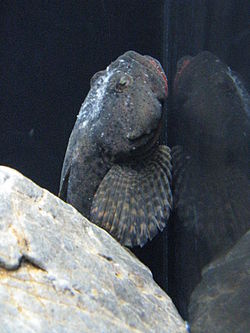杜父魚
Chinese
| fabricate; restrict; to prevent | father | fish | ||
|---|---|---|---|---|
| trad. (杜父魚) | 杜 | 父 | 魚 | |
| simp. (杜父鱼) | 杜 | 父 | 鱼 | |
| alternative forms | 渡父魚/渡父鱼 | |||
Etymology
渡父 (“one who steers a boat”) + 魚/鱼 (yú, “fish”).
Pronunciation
- Mandarin
- (Standard Chinese)+
- Hanyu Pinyin: dùfùyú
- Zhuyin: ㄉㄨˋ ㄈㄨˋ ㄩˊ
- Tongyong Pinyin: dùfùyú
- Wade–Giles: tu4-fu4-yü2
- Yale: dù-fù-yú
- Gwoyeu Romatzyh: duhfuhyu
- Palladius: дуфуюй (dufujuj)
- Sinological IPA (key): /tu⁵¹⁻⁵³ fu⁵¹ y³⁵/
- (Standard Chinese)+
Noun
杜父魚
Japanese
Etymology 1

| Kanji in this term | ||
|---|---|---|
| 杜 | 父 | 魚 |
| かまきり | ||
| Jinmeiyō | Grade: 2 | Grade: 2 |
| jukujikun | ||
| Alternative spelling |
|---|
| 鎌切 |
Apparently from 鎌切 (kamakiri, “mantis”), possibly from the way the pectoral fins are smooth on the upper edge and webbed with sharp rays along the lower edge, somewhat similar to a mantis's forelegs, or from the way the fish lies in wait to grab prey, similar to a mantis.
The kanji are jukujikun (熟字訓), from Chinese 杜父魚 / 杜父鱼 (dùfùyú).
Pronunciation
Noun
- a fourspine sculpin (species Cottus kazika); very similar to the kajika (see below), but larger
Usage notes
The synonym 鮎掛 (ayukake) is much more commonly used, to avoid confusion between the fish and the insect senses of the term kamakiri.
Note that the species name Cottus kazika does not refer to the kajika (see below), but rather to the kamakiri or ayukake.
Synonyms
- 鮎掛 (ayukake) (more common)
- 杜父魚 (kakubutsu) (rare; see below)
Etymology 2
| Kanji in this term | ||
|---|---|---|
| 杜 | 父 | 魚 |
| かくぶつ | ||
| Jinmeiyō | Grade: 2 | Grade: 2 |
| jukujikun | ||
Unknown.
The kanji are jukujikun (熟字訓), from Chinese 杜父魚 / 杜父鱼 (dùfùyú).
Pronunciation
Noun
- (rare) a fourspine sculpin (species Cottus kazika); very similar to the kajika (see below), but larger
Usage notes
The kamakiri reading is more common for the fish sense. However, the synonym 鮎掛 (ayukake) is much more commonly used, to avoid confusion between the fish and the insect senses of the term kamakiri.
Etymology 3

| Kanji in this term | ||
|---|---|---|
| 杜 | 父 | 魚 |
| かじか | ||
| Jinmeiyō | Grade: 2 | Grade: 2 |
| jukujikun | ||
| Alternative spellings |
|---|
| 鰍 (more common) 鮖 |
Possibly from 河鹿 (kajika, literally “river deer”), the short name for 河鹿蛙 (kajika-gaeru, “Japanese river frog”), from the way the fish can resemble a young frog or tadpole as it sits on the bottom.
Alternatively, possibly derived from the same roots as 河鹿 (kajika) in reference to the fish's use as food, ultimately as a compound of 河 (kawa, “river”) + 鹿 (shika, “deer”): /kawa ɕika/ → /kad͡ʑika/.
The kanji are jukujikun (熟字訓), from Chinese 杜父魚 / 杜父鱼 (dùfùyú).
Pronunciation
Noun
- a Japanese fluvial sculpin (species Cottus pollux); very similar to the kamakiri (see above), but smaller
Synonyms
Etymology 4
| Kanji in this term | ||
|---|---|---|
| 杜 | 父 | 魚 |
| と Jinmeiyō |
ふ Grade: 2 |
ぎょ Grade: 2 |
| kan'on | ||
Appears to be a borrowing from Middle Chinese 杜父魚 (MC duX pjuX|bjuX ngjo). The 漢音 (kan'on), so a later borrowing after the end of the Old Japanese stage of the language.
Pronunciation
Noun
- a Japanese fluvial sculpin (species Cottus pollux), more commonly known as 鰍 (kajika)
Usage notes
This reading is generally only used in contexts relating to China or the Chinese language.
Synonyms
References
- ↑ 1.0 1.1 1.2 1.3 1.4 Matsumura, Akira, editor (2006), 大辞林 (in Japanese), Third edition, Tokyo: Sanseidō, →ISBN
- ↑ 2.0 2.1 NHK Broadcasting Culture Research Institute, editor (1998), NHK日本語発音アクセント辞典 (in Japanese), Tokyo: NHK Publishing, Inc., →ISBN
- ↑ 3.0 3.1 Kindaichi, Kyōsuke et al., editors (1997), 新明解国語辞典 (in Japanese), Fifth edition, Tokyo: Sanseidō, →ISBN
- ^ Shōgaku Tosho (1988) 国語大辞典(新装版) (in Japanese), Tōkyō: Shogakukan, →ISBN

